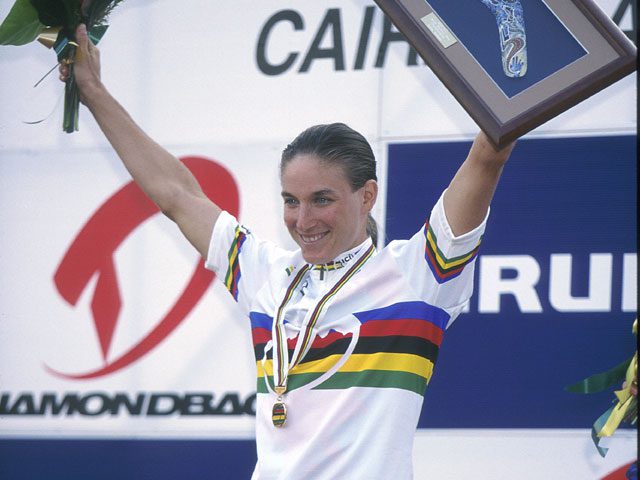Canadian Cycling Hall of Fame inductees announced
For the first time, the ranks of Canadian cycling have an official pantheon of honour, and the inaugural roster of the top Canuck names in the sport has been released.


For the first time, the ranks of Canadian cycling have an official pantheon of honour, and the inaugural roster of the top Canuck names in the sport has been released. To be permanently housed at Milton, Ont.’s Mattamy National Cycling Centre, the Canadian Cycling Hall of Fame is a celebration of not just the sport’s Canadian history, but of some of the best moments in cycling history overall.
Given the performance of Canadian athletes this year as just one example, topping the list of Canada’s immortal who’s-who in the cycling world — as these names have in one way or another — puts these riders near the top of their game worldwide.
Steve Bauer, of course, needs no introduction in terms of his merits as a Canadian athlete. But it’s the pioneering nature of his achievements wearing the Maple Leaf, not just his prowess on two wheels, for which the venerable Canadian ride is remembered. At the 1984 Olympics, Bauer took Canada’s first ever medal in the sport with a silver finish — and from there, the history of Bauer’s professional career began. A bronze at that year’s world championships followed, as well as silver in 1988. Over the next twelve years, Bauer would ride in eleven Tours de France. Over those competitions, Bauer would wear the coveted yellow leader’s jersey the most out of any Canadian rider.
Tanya Dubicoff also made history in 1993, when her world championship made her the first Canadian woman to claim the prestigious title. International-level competitions representing Canada followed for the powerhouse rider, with three Olympiads, three Pan Am Games, and two Commonwealth Games over the course of her career. At 1999’s Pan Am Games in Winnipeg, Dubicoff’s home town, she added two gold medals at that event alone to her overall haul of four over the course of her career.
Curt Harnett‘s track record is nothing short of astounding: four Olympic performances earning three medals, with silver in 1984’s 1,000 metre time trial and bronze in both the 1992 and 1996 math sprints. Beyond that, he also boasts two silver medals at the world championships, and from his appearances at the World Cup, five gold medals and three silver. At the 1990 and 1994 Commonwealth Games, he took two match sprint silver medals, with bronze in the same event and gold in the 1,000 metre time trial at the 1987 Pan Am Games.
Jocelyn Lovell‘s prestige as a Canadian cyclist, meanwhile, is legendary. While still a teenager in 1968, Lovell was named to the Olympic squad that represented Canada in Mexico City, which he followed up with three medals at the Edinburgh Commonwealth Games in 1970. Notably, his gold medal performances at the 1971 and 1975 Pan Am Games set a record that towered over the sport for the next 28 years.
Gordon Singleton was another rider who came to prominence during the 1970s. In Edmonton, Singleton took to the podium with gold and bronze-medal wins at the 1978 Commonwealth Games, an achievement that launched his meteoric rise to international stardom as a cyclist. Records in 200 metre, 500 metre and 1000 metre competitions were shattered with new ones set, with the bar raised by Singleton setting the standard for years. In 1982, he would also count himself among the riders who made Maple Leaf history, earning the country’s first world championship win.
Much farther back in the cycling history books, Torchy Peden established himself a major contender against the aggressive, highly-competitive fields riding in six-day hauls between 1929 and 1948. Having already established a reputation riding for Canada at the 1928 Olympics, Peden made that nineteen-year era his own with 24 wins in 48 races. Torchy and his brother, Doug, were a common sight in competition as a team.
In more recent history, the name Lori-Ann Muenzer is known to Canadian cycling fans and observers as the match sprint winner at the 2004 Athen Olympics. Not one to be reduced to just one incredible, dramatic win, though, Muenzer also won six world championship titles in match sprint, flying and standing events, silver and bronze medals at the 2002 Commonwealth Games, and at the Pan Am Games, took the title in both the keirin and match sprint.
Alison Sydor made cycling history in 1991 as the first Canadian woman to win a medal in road race competition. Then, shifting gears, the long-time road rider took to mountain biking, a discipline in which she would prove to be no less a contender than on the asphalt. Between 1992 and 2004, Sydor would win ten world championship titles, with notable rides in 1994, 1995 and 1996, and of course, her silver medal at the 1996 Atlanta Olympics.
Outside the ranks of athletes, Marc Lemay has been inducted into the Hall of Fame’s category of Builders, those who have made a significant contribution to establishing Canadian cycling over the years. From 1981 to 1992, Lemay was the president of the Canadian Cycling Association, and served on the Canadian Olympic Association board of directors from 1982 to 1996. His shepherding of the sport at an official level also involved work on the global stage, with his pioneering efforts in furthering the UCI’s Mountain Bike Commission from 1990 to 2001. Among his achievements in that capacity, Lemay is especially remembered for adding men’s and women’s cross country events to the Olympic program for the 1996 Olympics in Atlanta.
This year’s inductees to the Canadian Cycling Hall of Fame — the first such roster in its history — will be formally recognized on Saturday, October 10, with a luncheon and gala in Milton, Ont. Tickets are available and can be purchased online.
